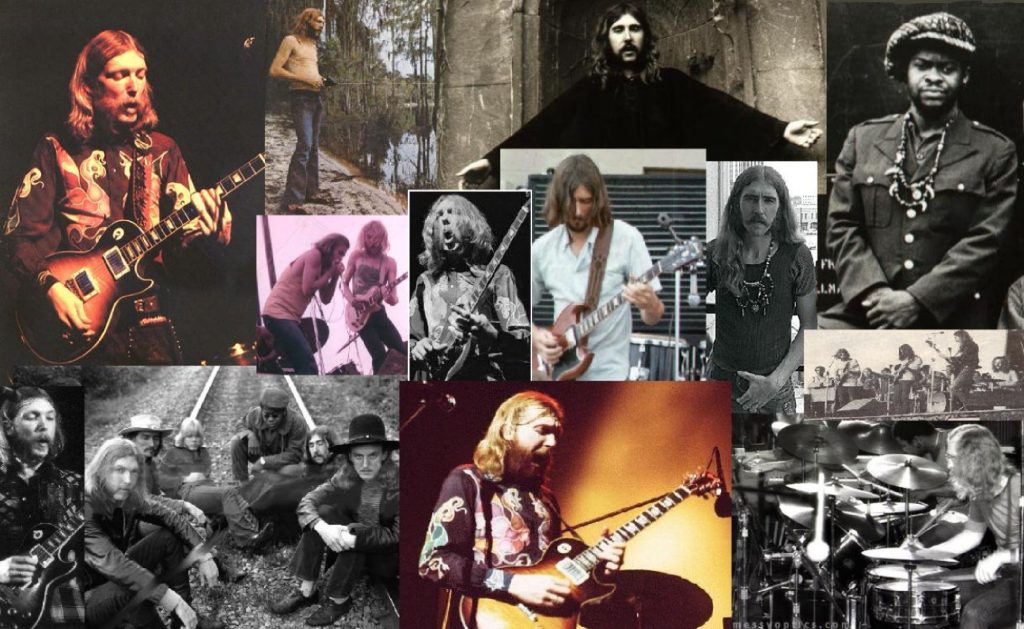
The Allman Brothers Band: The Radiant Beauty of “Blue Sky”
When The Allman Brothers Band released “Blue Sky” in 1972, it quickly became a defining track in their storied catalog, capturing the essence of Southern rock with a blend of heartfelt lyrics, intricate guitar work, and a warm, inviting atmosphere. Featured on their critically acclaimed album Eat a Peach, “Blue Sky” stands out as one of the band’s most beloved songs, showcasing their unique ability to blend rock, blues, and country into a seamless and soulful sound.
Written by guitarist Dickey Betts as a tribute to his Native American wife, Sandy “Bluesky” Wabegijig, the song exudes a sense of love, peace, and optimism that resonates deeply with listeners. Betts’ vocals, which are sweet and mellow, perfectly convey the serene joy of being in love. The lyrics are simple yet poignant, painting a picture of a beautiful day spent under a clear blue sky, free from worries and full of gratitude for life’s simple pleasures. Lines like “You’re my blue sky, you’re my sunny day” and “Don’t fly away, ’cause I love what you do” reflect the warmth and affection that define the song’s core.
Musically, “Blue Sky” is a showcase for the band’s exceptional musicianship. The interplay between Dickey Betts and Duane Allman on guitars is nothing short of magical. Their harmonized guitar solos are among the most iconic in rock history, weaving together melodies that soar as high as the skies they sing about. These solos are not just technically impressive; they are filled with emotion, adding depth and texture to the song that elevates it beyond a simple love ballad. The way the two guitars dance around each other, sometimes in perfect harmony, sometimes in call-and-response, is a testament to the unique chemistry that defined The Allman Brothers Band.
“Blue Sky” also benefits from the band’s tight rhythm section, with Berry Oakley‘s melodic bass lines providing a solid foundation, and Butch Trucks and Jai Johanny “Jaimoe” Johanson laying down a groove that is both steady and dynamic. The gentle swing of the drums complements the song’s breezy vibe, giving it a laid-back, almost effortless feel. It’s this combination of technical skill and emotional warmth that makes “Blue Sky” such a timeless piece of music.
Upon its release, “Blue Sky” became a fan favorite, though it did not chart as a single. However, its impact was profound, becoming a staple of The Allman Brothers Band’s live performances and a song that encapsulates the spirit of the band. Over the years, it has gained recognition as one of the group’s most enduring and beloved tracks, often cited by fans as a perfect example of the Allman Brothers’ ability to create music that is both deeply personal and universally relatable.
In the broader context of The Allman Brothers Band‘s career, “Blue Sky” represents a moment of lightness and hope amidst the turbulence the band often faced. It’s a song that speaks to the enduring power of love and the beauty of life’s simplest moments, all set against the backdrop of some of the most sublime guitar work ever recorded. For fans of the band, and for lovers of classic rock in general, “Blue Sky” remains a beacon of positivity and a reminder of the incredible talent that made The Allman Brothers Band one of the most influential groups of their time.
“Blue Sky” is more than just a song—it’s a celebration of life, love, and the magic that happens when great musicians come together to create something truly special. Whether you’re listening on a sunny day or finding solace in its warm embrace during tougher times, “Blue Sky” is a track that continues to uplift and inspire, just as it has for over four decades.